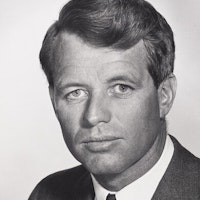Moral Courage Is
Topic: Courage, Integrity, & Purpose
Few are willing to brave the disapproval of their fellows, the censure of their colleagues, the wrath of their society. Moral courage is a rarer commodity than bravery in battle or great intelligence. Yet it is the one essential, vital quality for those who seek to change a world that yields most painfully to change. Each time a person stands up for an idea, or acts to Improve the lot of others, or strikes out against injustice, (s)he sends forth a tiny ripple of hope, and crossing each other from a million different centers of energy and daring, those ripples build a current that can sweep down the mightiest walls of oppression and resistance.
Robert F. Kennedy (1925-1968)
Robert F. Kennedy was a U.S. attorney general, U.S. senator from New York, and presidential candidate. He was a champion of civil rights and social justice. He was assassinated while campaigning for president in 1968.
Kennedy was born into a wealthy and powerful family, but he used his position to help others. He was a fearless advocate for the poor and the disadvantaged. He was also a strong advocate for peace and diplomacy.
After graduating from Harvard University and the University of Virginia School of Law, Kennedy served in the U.S. Navy during World War II. After the war, he worked as a lawyer and then as a campaign manager for his brother, John F. Kennedy, who was elected president in 1960.
Kennedy's Career in Public Service
As attorney general, Kennedy fought for civil rights and social justice. He also prosecuted organized crime. He was a key figure in the passage of the Civil Rights Act of 1964 and the Voting Rights Act of 1965.
Kennedy was also a strong advocate for peace and diplomacy. He played a key role in the Cuban Missile Crisis, helping to avert a nuclear war. He also worked to improve relations with the Soviet Union.
In 1964, Kennedy resigned as attorney general to run for U.S. Senate from New York. He won the election and served in the Senate from 1965 until his assassination in 1968.
Kennedy's Legacy
In 1968, Kennedy ran for president. He was assassinated while campaigning in California. His assassination was a tragedy for the United States and the world.
Kennedy was a complex and fascinating figure. He was a man of great privilege who used his position to help others. He was a champion of the poor and the disadvantaged, and he fought for civil rights and social justice. He was also a strong advocate for peace and diplomacy. Kennedy's legacy continues to inspire people around the world.
Papers of Robert F. Kennedy. Senate Papers. Speeches and Press Releases, Box 2, "'Freedom & Democracy' University of Cape Town, Cape Town, South Africa." John F. Kennedy Presidential Library.

Robert F. Kennedy
Theme: Moral Courage


About This Robert F. Kennedy Quotation [Commentary]
Robert F. Kennedy reminds us that “moral courage is a rarer commodity than bravery in battle or great intelligence.” He does not deny the value of those qualities, but he distinguishes moral courage as something more difficult to find. It involves the willingness to endure “the disapproval of their fellows, the censure of their colleagues, the wrath of their society.” This kind of courage is not driven by recognition or reward—it is guided by conviction. Kennedy calls it “the one essential, vital quality for those who seek to change a world that yields most painfully to change.”
His words point to the quiet strength of those who act not for approval but for justice. When a person “stands up for an idea, or acts to improve the lot of others, or strikes out against injustice,” Kennedy says, they send out “a tiny ripple of hope.” These small acts are not insignificant. As he describes it, when such ripples “cross from a million different centers of energy and daring,” they gather force. They build “a current that can sweep down the mightiest walls of oppression and resistance.” This is how change begins—not through dramatic gestures, but through sustained and sincere acts of conscience.
Kennedy’s vision continues to speak clearly. He believed that moral courage, though rare, has real power to shape the world. It does not require perfection, only the willingness to stand firm in the face of resistance. Even modest actions can carry meaning, especially when joined with others. His words encourage us to recognize that moral courage begins with individual choices—and that each choice, however small, contributes to a broader movement toward justice.
Rabbi Jonathan Sacks [Commentary]
Liberal democratic politics is the politics of peace. It is not dramatic, heroic, the stuff of Homer or Virgil. But it does stop us killing one another in the name of faith. And it does honor the greatest of all religious truths: That God speaks not in the whirlwind, the earthquake, or the fire but in the still, small voice that echoes in the silence of the soul and helps us, in Robert Kennedy’s fine phrase, ‘to tame the savageness of man and make gentle the life of this world.’
—Sacks, Jonathan. The Home We Build Together: Recreating Society. Continuum, 2009, p. 227 [Jonathan Sacks, The Home We Build Together].
Resources
Related Quotes
Copyright © 2017 – 2026 LuminaryQuotes.com About Us